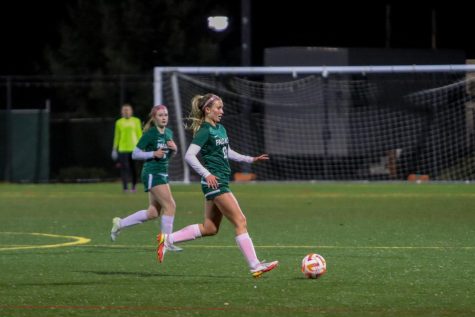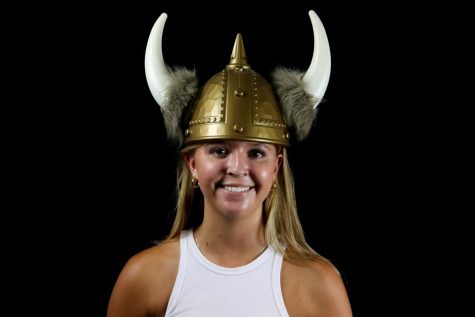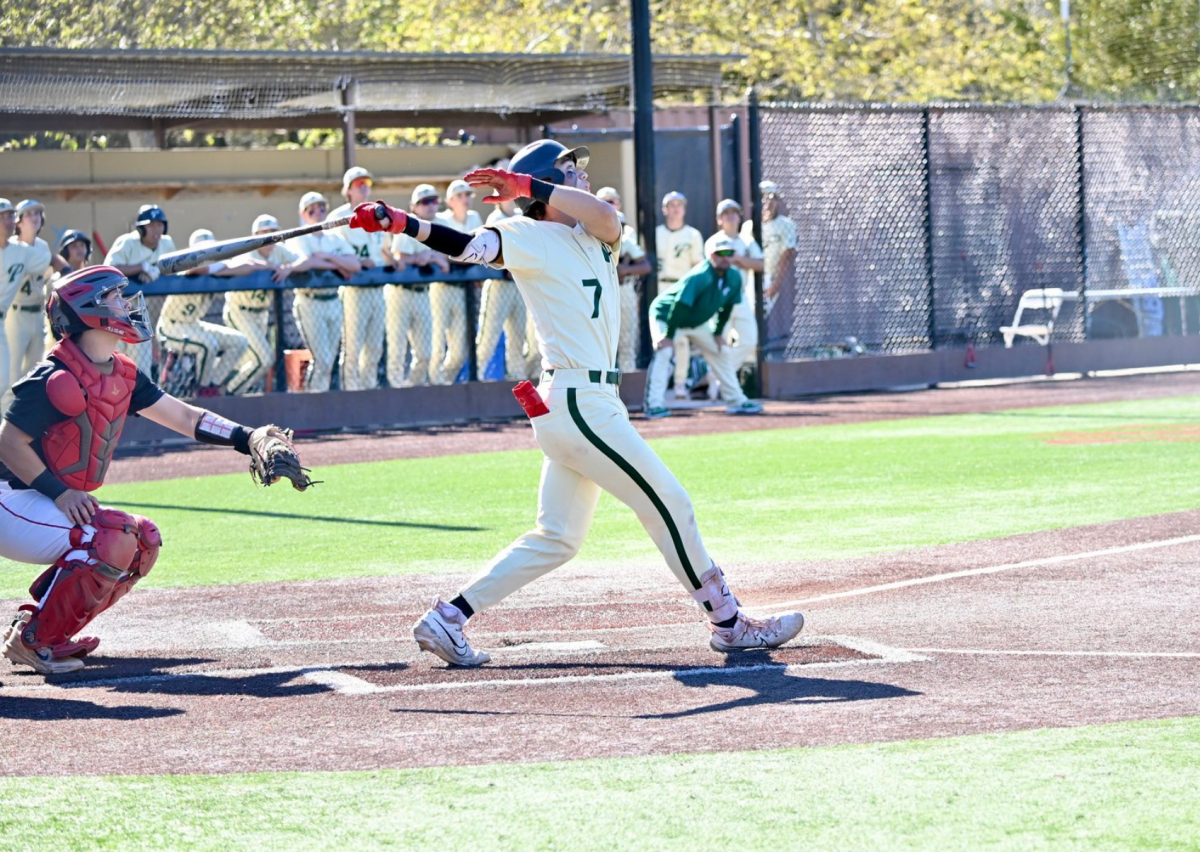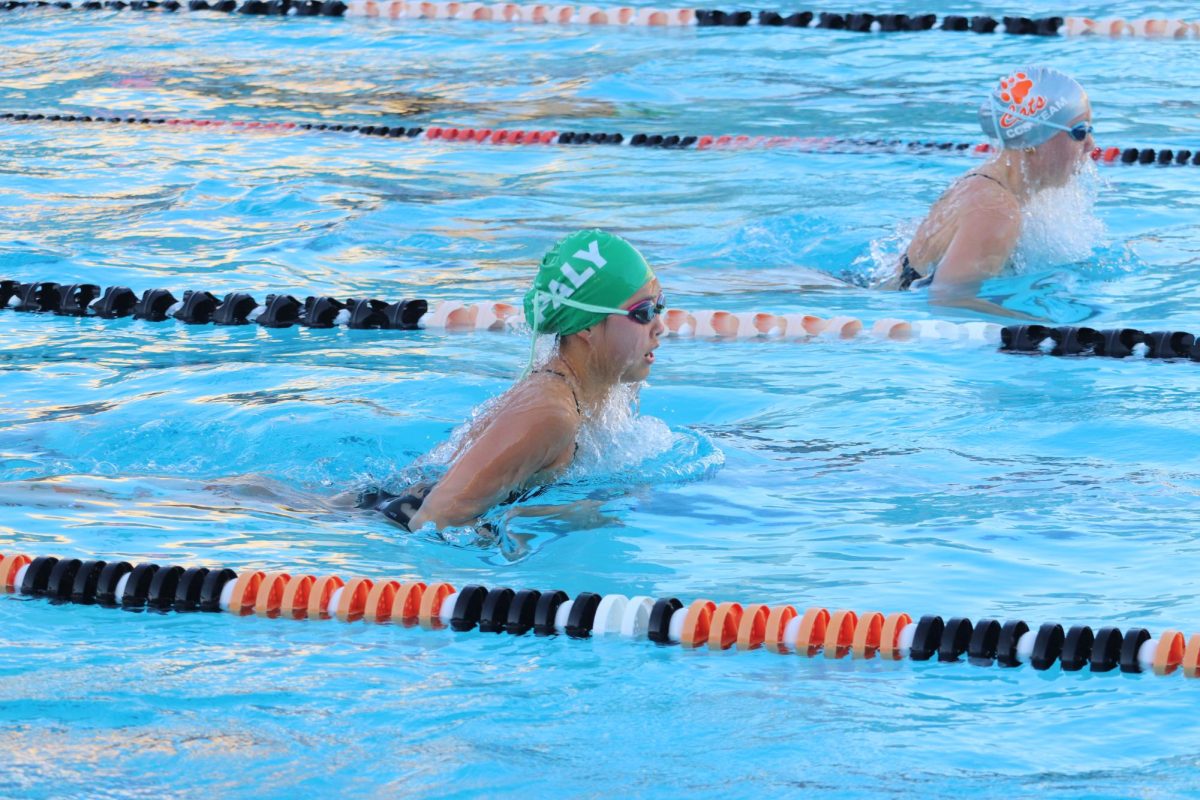Paly Girls Soccer Team Faces Ineligibility
January 23, 2023
During the winter months, on any given morning at seven, the Paly lacrosse field is full of players. But not from field hockey or lacrosse. Instead, it is the girls soccer team, warming up on the turf: running laps, passing the ball around and performing drills. However, out of all the players there, eight players on the Paly roster have lost the eligibility to play in games for Paly’s team. Still, the ineligible players remain devoted to their teammates, continuing to show up at practices and cheer on at games. But why can’t they play?
Two months ago, on the weekend of December 2nd –– five days after the deadline instituted by SCVAL for soccer players to stop playing for their club teams –– eight players from the Paly women’s soccer team attended a college showcase event in Arizona through their club team. After an anonymous email was sent to Paly administrators revealing this fact, these players lost their eligibility to compete for the remainder of the high school soccer season. Of the eight ineligible players, five of them were seniors, two of them were sophomores and one was a junior.
CCS, the governing body of athletics for the central coast, states in their regulations that “a student on a high school team becomes ineligible if the student competes in a contest on an ‘outside’ team, in the same sport, during the student’s high school season of sport.” This means that by the first League competition, each athlete must pick between club or high school sports, but they cannot do both. If a player were to play in a club event, the team would be forced to forfeit two games for each event that the player participated in.
In addition to this umbrella regulation by CCS, individual leagues can create stricter regulations surrounding the “club versus high school” rule. Paly’s league –– SCVAL –– along with WCAL, another high school league, have both done so, specifically for winter sports. Article 3, Section 10 of the SCVAL Soccer Bylaws states, “If a player participates in a contest for a outside team, in the same sport, during the high school sports season, after this deadline [the Monday after Thanksgiving break], they will no longer be able to participate on the high school team for the remainder of that season.”
Thus, Palo Alto players must choose between club competitions and school competitions two weeks before leagues who do not have this regulation. Paly athletic director Jennifer Crane notes that there are arguments both for and against keeping this stricter SCVAL rule.
“It’s basically a rule that alleviates winter athletes hav[ing] to juggle a heavy [school] schedule and then have to choose between one or the other [club or high school],” Crane said. “But I can understand the perspective of the athlete: it is unfair for our league to have more restrictive rules around this than CCS already has in place, which is what all of their leagues follow. [The athletes] are forced to choose [earlier] and miss out on opportunities to play for their club.”
The Silicon Valley Soccer Academy team that attended the showcase plays for the Girls Academy League (GA). A part of playing in this league requires academy-linked teams to attend their showcases. If the team had chosen not to attend, they would have had to pay a large fee to the Academy.
“We just went in with the assumption that we could play,” senior Kath Stein, who is currently ineligible to play, said. “Both of our coaches said, ‘Yeah, you’re good to go to the Showcase.’ My club coach didn’t really give us a choice, it was kind of just like we needed to play for the club because that’s always our first priority.”
One of the main opportunities playing at the club level provides is exposure to college coaches and various recruiting opportunities. By attending showcases, players can showcase their skills and potentially be recruited by college coaches.
“It’s been a long-term goal of mine to play soccer in college, so I’ve been trying to get recruited all throughout high school,” senior Mars Bau said. Bau is one of the eight ineligible players. “That’s why Arizona [the showcase] was important to me as a chance to play in front of [college] coaches.”
Although the players were aware of the rule barring them from playing club, they were under the impression –– from the coaches both at Paly and on their club team –– that it would be “okay” to attend the event because it did not fall under the jurisdiction of the rule, as it was a showcase. They were not discouraged from going.
“[The club coaches] told us that there was a rule for SCVAL that prohibited club competitions from coinciding with the high school season; however, they said recruiting events were an exception,” Bau said.
Just a few days after attending the event, the players were contacted by the then-Paly coach (who was later asked to leave her post at the school) informing them that they were no longer eligible to play their high school season. To some players, this felt like a complete reversal of direction. Many felt that the coach misled them: they were unaware of the consequences they would face after attending the tournament.
“[The coach] got a notice before we left: a letter saying that if we did go [to the showcase] we wouldn’t be able to play high school, but she didn’t tell us that,” Stein said. “We had the assumption that we could play both and we even thought that when we got back. I wouldn’t have gone if our [high school] coach told us that she got that letter.”
Bau felt similarly misled, noting that now the frustration of missing their season is directed towards the coaches and the league as a whole.
“I’m frustrated because I feel that we, as students, as minors, were let down by the larger institutions and adults who were supposed to advocate for us,” they said. “There were mistakes made on their part and it’s upsetting to know that we’re the ones bearing the brunt of that punishment.”
Not only does the ineligibility of these players hurt the Paly Girls’ soccer team –– losing eight starters –– but it deeply impacts the individual players, especially the five seniors who lost the opportunity to play games in their senior season.
“You are always looking forward to being a senior, and the thing that we’ve been looking forward to for four years is like taken away from us for this one little thing that doesn’t affect anybody,” Stein said. “It just really sucks and is really sad.”
Similarly to Stein, Bau reiterated how this regulation not only affects them but instead the entire team.
“I think all athletes in high school sports look forward to their senior night, so to see that slip away was extremely disheartening,” Bau said. “I feel bad for my teammates who weren’t suspended too; they really had the least control over the whole situation and still have to suffer the consequences. Losing eight players is a big deal, especially when five of them are seniors.”
Despite the disheartening turn of events for these players, most are making the best of it. Although they are not allowed to participate in games or scrimmages, many still attend practices –– including the ones in the morning –– and cheer on their teammates at games.
“Morning practices are at 7:00 am and it’s been rainy for the past few weeks, but I feel that all of us plan to show up as if we were playing,” Bau said. “For games, we’re trying to maintain that sense of team spirit and tradition.”
Crane notes that she understands the difficulty of the situation and applauds the dedication to the team that these players have, and are continuing to, put in, despite less-than-ideal circumstances.
“It makes me happy to see them showing up even though they know they can’t play in the game,” Crane said. “That says a lot about an individual and their character and values: those are leaders. Leaders that can continue to show up for something that matters to them and their teammates, even though they’re in a tough situation.To me, that speaks volumes.”
Although the CCS and SCVAL rules were initially enforced to remove the choice between the club and high school soccer, the players feel the SCVAL rule specifically has done more harm than good.
“I think club is important because it makes up that majority of the year, has extremely high-level soccer, and provides the most opportunity for recruiting; but the high school experience is one where team bonding and school spirit take precedence,” Bau said. “If I could change the SCVAL rules, I’d like them to at least match CCS regulations. I feel the inconsistency doesn’t make sense.”
On the morning of January 19, the SCVAL Board voted against Principal Kline’s motion to align the SCVAL rules with those of CCS in order to allow the players to return to games. Unfortunately for the players, where a 2/3 majority was needed, the vote was 7 in favor of the motion 6 against, and 2 abstained according to Crane.
“I’m disappointed we didn’t get the results we wanted but I didn’t commit to the meeting with that being the only end goal,” Bau said. “I wanted to at least see this to the end and pitch our case; I wanted to set a precedent or a jumping point for future athletes affected by this rule.”
Editor’s Note: All eight players are still on the roster of the Palo Alto

Varsity Girls’ Soccer team, although they are considered ineligible for games.








